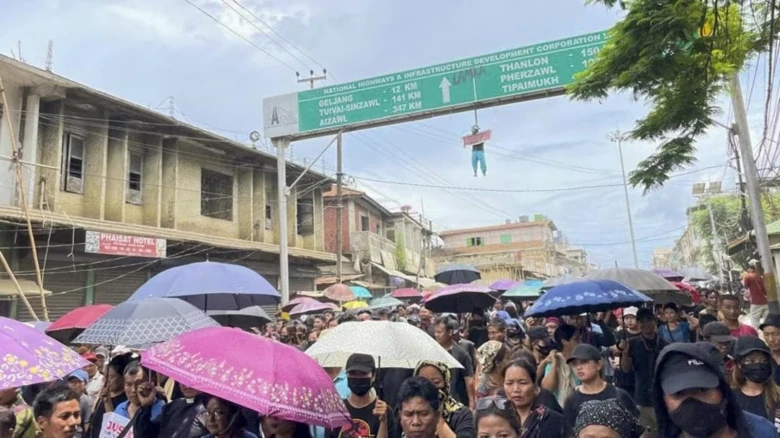They expressed solidarity with the call for peace but vehemently opposed the demand for a separate Union Territory...
Digital Desk: Thousands of protesters from the Kuki-Zo tribal community in Manipur have taken to the streets, demanding an end to ongoing ethnic violence and advocating for the creation of a Union Territory for their people. This recent wave of demonstrations has underscored deep-rooted tensions in the state, prompting urgent calls for political intervention.
Organized by the Indigenous Tribal Leaders’ Forum (ITLF) and the Committee on Tribal Unity (COTU), mass rallies swept through Manipur’s Churachandpur, Kangpokpi, Tengnoupal, and Pherzawl districts. These areas, predominantly inhabited by the Kuki-Zo population, have borne the brunt of the violence, driving the community to seek decisive action.
In Churachandpur district, a significant gathering spearheaded by ITLF saw protestors marching fervently, demanding a swift political resolution to the prolonged unrest. The rally gained attention as Paolienlal Haokip, an MLA of the ruling Bharatiya Janata Party (BJP), joined in solidarity, emphasizing the urgency of the situation. The community highlighted in their memorandum to Union Home Minister Amit Shah the staggering toll of almost 200 lives lost, over 7,000 homes destroyed, and ongoing threats to their safety.
Central to their demands is the establishment of a Union Territory with legislative powers under Article 239A of the Indian Constitution. This move, they argue, would provide the Kuki-Zo community with the autonomy needed to address their security concerns and ensure equitable governance.
However, the protests have not been without opposition. In Imphal Valley, a Meitei-dominated area, women vendors from Khwairamband Ima Market staged their demonstration. They expressed solidarity with the call for peace but vehemently opposed the demand for a separate Union Territory. Their concerns centered on preserving Manipur's unity and integrity amidst escalating tensions.
The Khwairamband Ima Keithel Coordinating Committee for Peace gathered initially at Khwairamband Bazar, intending to march to the Manipur Raj Bhawan and the Chief Minister’s residence.
However, security forces redirected their procession near Kangla Fort, leading to a sit-in protest back at the market. Huirem Binodini, co-convenor of the Peace Committee, condemned the state’s leadership for what she described as a failure to address the crisis effectively. She called for immediate parliamentary intervention to prevent further escalation, cautioning that prolonged inaction could lead to severe consequences, including potential separatist sentiments.
The standoff reflects a broader challenge in Manipur, where ethnic tensions have simmered for years amidst political complexities and security concerns. The demand for a separate Union Territory by the Kuki-Zo community underscores their perceived marginalization and the failure of existing governance structures to protect their interests adequately.
As Manipur grapples with this multifaceted crisis, the role of political leadership and swift intervention is crucial. The protests highlight not only the immediate need for peace and security but also the imperative for inclusive governance that respects the diverse identities within the state.
While the protests signify a call for an urgent political resolution, they also reveal deep-seated divisions that must be addressed through dialogue and inclusive policymaking. The path forward demands a delicate balance between respecting the aspirations of different communities and safeguarding the unity and integrity of Manipur as a whole. Only through concerted efforts and meaningful dialogue can Manipur hope to achieve lasting peace and stability for all its citizens.

Leave A Comment